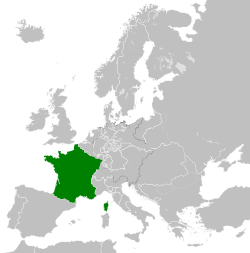1832 cholera epidemic
| Kingdom of France | ||||||||||
| Royaume de France | ||||||||||
|
||||||||||
|
|
||||||||||
|
Anthem La Parisienne "The Parisian" |
||||||||||
|
The French Kingdom in 1839
|
||||||||||
| Capital | Paris | |||||||||
| Languages | French | |||||||||
| Religion |
Roman Catholicism Calvinism Lutheranism Judaism |
|||||||||
| Government | Constitutional monarchy | |||||||||
| King of the French | ||||||||||
| • | 1830–1848 | Louis Philippe I | ||||||||
| Prime Minister | ||||||||||
| • | 1830 | Victor de Broglie (first) | ||||||||
| • | 1848 | Louis-Mathieu Molé (last) | ||||||||
| Legislature | Parliament | |||||||||
| • | Upper house | Chamber of Peers | ||||||||
| • | Lower house | Chamber of Deputies | ||||||||
| History | ||||||||||
| • | July Revolution | 26 July 1830 | ||||||||
| • | Constitution adopted | 7 August 1830 | ||||||||
| • | French Revolution | 23 February 1848 | ||||||||
| Currency | French franc | |||||||||
|
||||||||||
The July Monarchy (French: Monarchie de Juillet) was a liberal constitutional monarchy in France under Louis Philippe I, starting with the July Revolution of 1830 and ending with the Revolution of 1848. It began with the overthrow of the conservative government of Charles X and the House of Bourbon.
Louis Philippe, a member of the more liberal Orléans branch of the House of Bourbon, proclaimed himself as Roi des Français ("King of the French") rather than "King of France", emphasizing the popular origins of his reign. The king promised to follow the "juste milieu", or the middle-of-the-road, avoiding the extremes of either the conservative supporters of Charles X and radicals on the left.
The July Monarchy was dominated by wealthy bourgeoisie and numerous former Napoleonic officials. It followed conservative policies, especially under the influence (1840–48) of François Guizot. The king promoted friendship with Great Britain and sponsored colonial expansion, notably the conquest of Algeria. By 1848, a year in which many European states had a revolution, the king's popularity had collapsed, and he was overthrown.
Louis Phillipe was pushed to the throne by an alliance between the people of Paris; the republicans, who had set up barricades in the capital; and the liberal bourgeoisie. However, at the end of his reign, the so-called "Citizen King" was overthrown by similar citizen uprisings and use of barricades during the February Revolution of 1848. This resulted in the proclamation of the Second Republic.
...
Wikipedia



